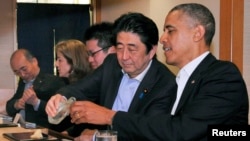Japanese Prime Minister Shinzo Abe is making plans to visit the United States later this month. His visit will come at a time when relations between the two countries are strong and growing stronger.
A high-level State Department official agrees that the U.S. and Japanese governments hold similar positions on many issues.
In recent years, Japan has supported U.S. policies and actions in many parts of the world. Deputy Secretary of State Antony Blinken says he welcomes Japan’s increasingly active involvement in the international community.
“We are close partners on the world stage, fighting Ebola, mitigating the impact of climate change, countering violent extremism, eliminating the threat of ISIL and other groups that challenge us.”
Recently, Secretary of Defense Ashton Carter visited Japan and South Korea. He spoke about President Barack Obama’s decision to “rebalance towards Asia” -- increasing the U.S. government’s attention on the area.
Antony Blinken says the United States will protect Japan from any threats it may face, including those arising from territorial disputes in the East China Sea.
“We have made it very clear that we oppose any unilateral actions that would seek to undermine in any way the Japanese administration.”
Joshua Walker is a fellow at the German Marshall Fund in Washington, D.C. He says China’s increasing activities in the Western Pacific have helped to strengthen the ties between the United States and Japan.
“A lot of this is driven by China. It’s kind of the elephant in the room, if you will. China’s aggressive actions in the South China Sea, and also in the Senkaku/Diaoyu island dispute has driven Japan much closer to the U.S. in a lot of ways.”
In 2014, 59 members of the U.S. Congress created a group to support relations between the United States and Japan. The new U.S.-Japan Caucus has members from the both Democratic and Republican parties. Texas Congressman Joaquin Castro is a Democrat and one of the leaders of the group.
“Japan is our most trusted ally in the Pacific region, and as we go forward we share an interest in human rights, in democracy, in trade and in making sure that our shared values are spread throughout the world.”
I’m Christopher Jones-Cruise.
Idrees Ali reported this story from Washington. Christopher Jones-Cruise wrote it for VOA Learning English. George Grow was the editor.
______________________________________________________________
Words in This Story
unilateral – adj. involving only one group or country
undermine – v. to make (something or someone) weaker or less effective, usually in a secret or gradual way
elephant in the room – idiom an obvious problem or difficult situation that people do not want to talk about
region – n. a part of a country or the world that is different or separate from other parts in some way
What is your opinion of the relationship between the United States and Japan? We want to hear from you. Write your thoughts in the comments section.







